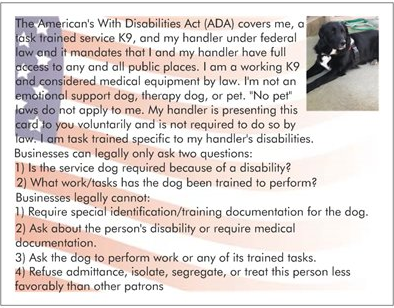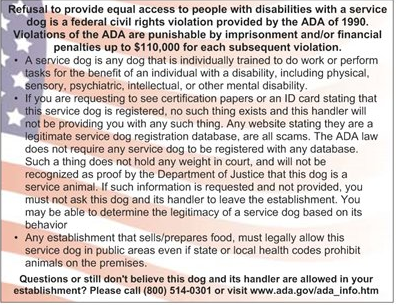For the past two years, I have been trying to obtain my own service dog. It was only in August of 2018 that I came across someone who was actually willing to train one for me. Although my first prospect didn’t work out, it was for the best because Leo and I both adore each other.
Leo isn’t just a pet, nor is he considered one; he is literally my lifeline.
Leo is a task-trained service dog specifically trained to help mitigate disabilities specific to my mental illnesses and no one else’s. He is not an emotional support dog, because emotional support dogs are not task trained and just provide comfort to their owners. He is not a therapy dog, because therapy dogs are trained specifically to help provide comfort to multiple people – you typically find them in hospitals or courtrooms. The Americans With Disabilities Act only recognizes two types of animals as service animals – dogs and miniature horses. Service animals are the only task-trained animals as well as the only animals that legally have public access rights.
While most people know of guide dogs – which are wonderful and allow people who are blind to live independent lives — they are not the only type of service dogs. Service dogs can help alleviate the effects of mobility impairments, seizure disorders, and mental illnesses such as post-traumatic stress disorder, depression, and anxiety disorders.
On paper according to my psychiatrist, my mental illnesses include major depressive disorder, panic and generalized anxiety disorders associated with paranoia symptoms, post-traumatic stress disorder, insomnia, and borderline personality disorder. They interfere with my daily lifestyle and have kept me from living independently for many years.
Shortly after high school, I developed an extreme, irrational fear of going anywhere in public by myself. I could only bring myself to go to the bank, get gas (on the condition that I paid at the pump) and go to work. I had to order daily living necessities online, and if I had to go to the store, I had to be accompanied by someone.
Eventually, at a routine visit, my psychiatrist brought up the possibility of me getting a service dog. Even though I was responding to treatment, my symptoms weren’t improving, so a service dog was my last resort.
Although Leo wears a vest with visible patches identifying him as a service dog, people still don’t seem to understand that he is considered medical equipment and what to do or not to do when seeing him.
Up until a week ago, I had never experienced any public access denial from any store or business owner. Most people just seemed to think that he is an emotional support animal or wanted to talk to him while he’s working. But at a routine grocery store outing, Leo and I experienced discrimination for the first time.
We didn’t make it more than five feet into the store before a man stopped us and said, “Sorry, but no dogs are allowed in here.” I responded that Leo is a service dog, so he was permitted in the store. He asked if I had registration papers, to which I responded “no,” because by law you are not required to register your service dog. He said if I did not have papers, I could not come inside. I told him denying Leo and I access is illegal and an ADA violation. He walked me outside to show me the section of the ADA they had posted stating that service dogs are the only dogs allowed in their store, which coincidentally was the exact law that allowed Leo and I to shop together. He repeated that if I didn’t have papers, I had to leave.


We came back shortly after with an information card I typically carry with me to explain what the law actually states for incidences like this. The lady up front said she had just spoken to the man, who was misinformed and very sorry. I asked her to please give the man the info card so he could educate himself. She asked what tasks Leo was trained to perform; I answered her, and then asked if I could please get what I needed. She let me shop as if nothing had happened.
The man came out shortly after and genuinely apologized. He said he had just started working at the store and was completely misinformed. I told him that I accepted his apology, but that what he did was completely illegal, and he cannot continue to deny other service dog handlers who come into the store. He again said he was sorry, and then walked by me to get behind the counter to check us out. While he walked by me, he pet Leo without asking, which you should never do to a working service dog.
Service dogs are working dogs. Someone petting them or talking to them to get their attention can interfere with the work the dog is trained to perform. It is also illegal for anyone to interfere with a service dog while it is working. Anyone who harms a service dog can be sued for damages.
All of this was as a result of someone who was completely uneducated on the law. I don’t know how the misconception of registered service dogs came to be, nor do I understand how common it seems to be. But I was denied access simply because I did not provide paperwork that is not even required by law.
Leo is as important to me as a wheelchair for someone who is paralyzed. When you see such a person enter a store, you wouldn’t dare ask them to provide proof they need their wheelchair, would you? I don’t know why people see service dogs any differently, and quite frankly, it’s very frustrating. It is pure discrimination to deny someone like me access to a public place simply because my medical equipment happens to be a dog.
This story originally appeared on Understanding Chaos.

